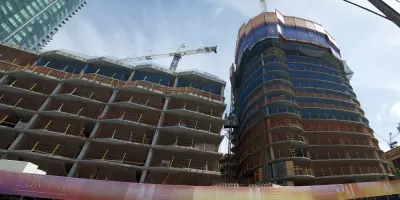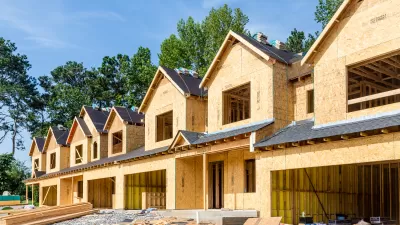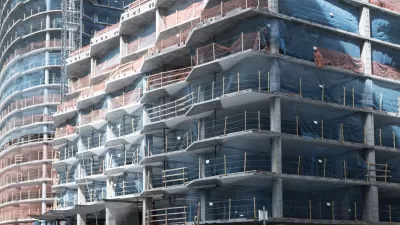Two new reports, and one older one, assign unequal significance of the ability of new market rate housing to filter older housing into affordability.

Darwin BonGraham reports: "According to a new report [pdf] by UC Berkeley researchers, the best way to prevent gentrification and displacement is to build affordable housing in cities and neighborhoods where rents and home prices are rising fastest."
"The Berkeley report is a rebuttal to an earlier, widely circulated report by the state Legislative Analyst Office [sic] that claimed the best way to prevent displacement of low-income households is to simply build more market rate housing as fast as possible," adds BondGraham. (Planetizen was one of the media outlets to circulate news of the LAO's report.)
The article includes specific details on how the new report from Berkeley researchers Miriam Zuk and Karen Chapple responds to the earlier LAO study. Among the claims made by the Berkeley study: although filtering (i.e., as new market rate units become available, older units become more affordable) does occur, the process takes longer than the LAO report acknowledges.
Just a few days after the release of the Berkeley study, the Oregon Office of Economic Analysis released the findings of an examination of filtering, writing in seeming agreement with that point. "The key is that filtering does not happen overnight. It is very much a longer run process," reads a post by Josh Lehner. However, the Oregon Office of Economic Analysis report concludes: "Filtering is also one of the major ways to provide reasonably priced workforce housing for those making in or around the median family income."
The rebuttal process also allows the Berkeley study to reach an important conclusion, as quoted directly from the study: "The development of market-rate housing may not be the most effective tool to prevent the displacement of low-income residents from their neighborhoods, nor to increase affordability at the neighborhood scale," and "to help stabilize existing communities we need to look beyond housing development alone to strategies that protect tenants and help them stay in their homes."
FULL STORY: UC Berkeley Report: Affordable Housing is Best Way to Combat Gentrifcation

Alabama: Trump Terminates Settlements for Black Communities Harmed By Raw Sewage
Trump deemed the landmark civil rights agreement “illegal DEI and environmental justice policy.”

Planetizen Federal Action Tracker
A weekly monitor of how Trump’s orders and actions are impacting planners and planning in America.

Why Should We Subsidize Public Transportation?
Many public transit agencies face financial stress due to rising costs, declining fare revenue, and declining subsidies. Transit advocates must provide a strong business case for increasing public transit funding.

Understanding Road Diets
An explainer from Momentum highlights the advantages of reducing vehicle lanes in favor of more bike, transit, and pedestrian infrastructure.

New California Law Regulates Warehouse Pollution
A new law tightens building and emissions regulations for large distribution warehouses to mitigate air pollution and traffic in surrounding communities.

Phoenix Announces Opening Date for Light Rail Extension
The South Central extension will connect South Phoenix to downtown and other major hubs starting on June 7.
Urban Design for Planners 1: Software Tools
This six-course series explores essential urban design concepts using open source software and equips planners with the tools they need to participate fully in the urban design process.
Planning for Universal Design
Learn the tools for implementing Universal Design in planning regulations.
Caltrans
Smith Gee Studio
Institute for Housing and Urban Development Studies (IHS)
City of Grandview
Harvard GSD Executive Education
Toledo-Lucas County Plan Commissions
Salt Lake City
NYU Wagner Graduate School of Public Service





























